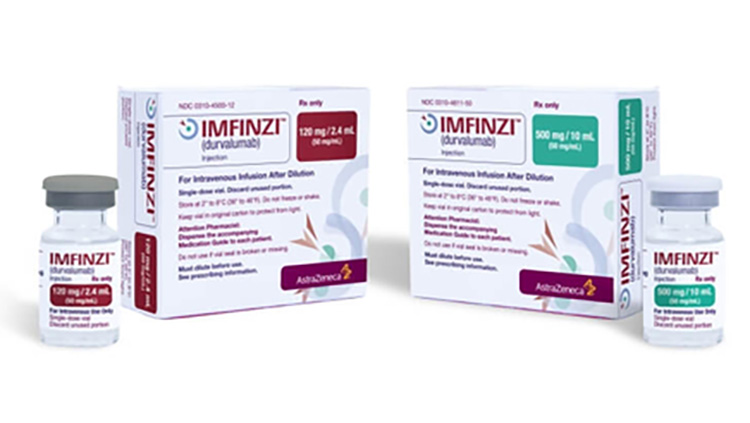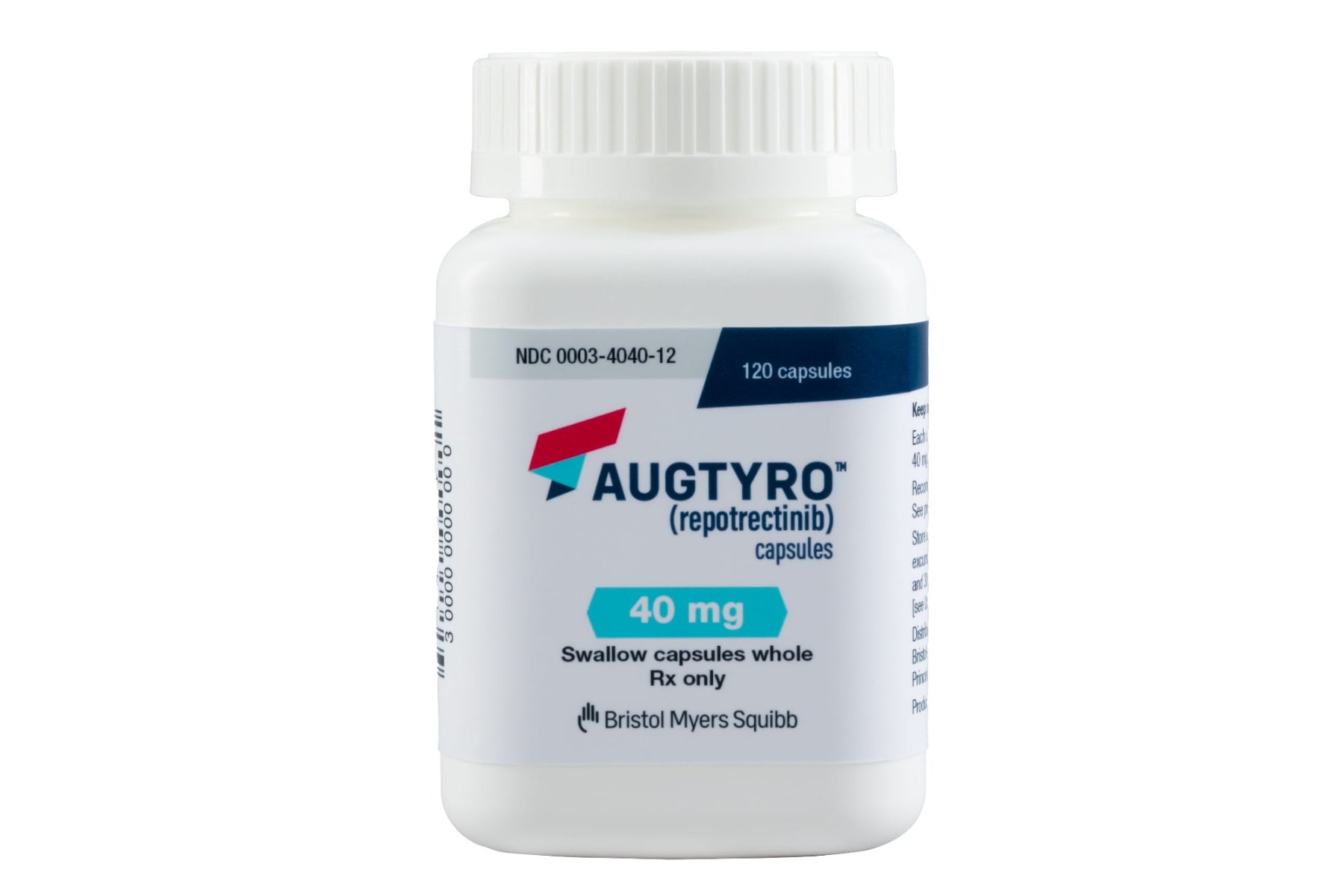Imfinzi (durvalumab) vs Augtyro (repotrectinib)
Imfinzi (durvalumab) vs Augtyro (repotrectinib)
Imfinzi (durvalumab) is an immune checkpoint inhibitor specifically targeting the PD-L1 protein, used primarily in the treatment of certain types of urothelial carcinoma and non-small cell lung cancer. Augtyro (repotrectinib), on the other hand, is a tyrosine kinase inhibitor designed to target cancers with specific genetic mutations, such as those involving the TRK, ROS1, or ALK genes, and is used in the treatment of solid tumors with these alterations. The choice between Imfinzi and Augtyro would depend on the specific type of cancer a patient has and its molecular profile, as determined by biomarker testing, so it is essential to consult with an oncologist to determine which medication is appropriate based on the individual's cancer characteristics.
Difference between Imfinzi and Augtyro
| Metric | Imfinzi (durvalumab) | Augtyro (repotrectinib) |
|---|---|---|
| Generic name | Durvalumab | Repotrectinib |
| Indications | Urothelial carcinoma, non-small cell lung cancer, extensive-stage small cell lung cancer | Advanced solid tumors with NTRK gene fusions, ROS1-positive non-small cell lung cancer |
| Mechanism of action | PD-L1 inhibitor that helps the immune system attack cancer cells | Tyrosine kinase inhibitor targeting TRK, ROS1, and ALK |
| Brand names | Imfinzi | Augtyro |
| Administrative route | Intravenous infusion | Oral |
| Side effects | Fatigue, musculoskeletal pain, constipation, decreased appetite, nausea, peripheral edema, urinary tract infection, fever, rash | Dizziness, constipation, fatigue, edema, diarrhea, nausea, dysgeusia, abdominal pain, cough, vomiting |
| Contraindications | Patients with severe hypersensitivity to durvalumab or any of its excipients | Patients with severe hypersensitivity to repotrectinib or any of its excipients |
| Drug class | Anti-PD-L1 monoclonal antibody | Tyrosine kinase inhibitor |
| Manufacturer | AstraZeneca | Turning Point Therapeutics, Inc. |
Efficacy
Imfinzi (Durvalumab) and Its Efficacy in Lung Cancer
Imfinzi (durvalumab) is an immunotherapy drug that belongs to a class of medications known as PD-L1 inhibitors. It is approved for the treatment of certain types of lung cancer, including unresectable, Stage III non-small cell lung cancer (NSCLC) following chemoradiation therapy, and extensive-stage small cell lung cancer (SCLC) as part of combination therapy. Durvalumab works by blocking the interaction between PD-L1 on tumor cells and PD-1 on T cells, thereby enhancing the body's immune response against cancer cells. Clinical trials have demonstrated that Imfinzi can significantly improve median progression-free survival in patients with Stage III NSCLC who do not have disease progression following concurrent platinum-based chemotherapy and radiation therapy.
In the PACIFIC trial, a pivotal Phase III study, patients with Stage III NSCLC treated with Imfinzi after chemoradiation therapy showed a substantial improvement in overall survival compared to placebo. The study reported a 32% reduction in the risk of death with durvalumab, which is a significant advancement in the treatment of this lung cancer stage. The drug has been considered a standard of care in this setting due to these findings, offering a new hope for patients with a historically poor prognosis.
Augtyro (Repotrectinib) and Its Efficacy in Lung Cancer
Augtyro (repotrectinib) is an investigational, next-generation tyrosine kinase inhibitor targeting the tropomyosin receptor kinases (TRK), ROS1, and ALK rearrangements. While not yet approved for the treatment of lung cancer, repotrectinib has shown promising results in early clinical trials for NSCLC patients with ROS1 or NTRK fusions, which are genetic alterations that can drive tumor growth. In these patients, repotrectinib has been designed to overcome resistance to prior therapies and to have increased penetration into the central nervous system, which is particularly important for treating brain metastases commonly associated with these genetic alterations.
Preliminary data from ongoing clinical trials suggest that repotrectinib may offer a high degree of efficacy for patients with ROS1-positive NSCLC, including those who have developed resistance to prior ROS1 inhibitors. The results indicate a favorable response rate and durability of response, though the drug is still undergoing further investigation to confirm these findings. As such, repotrectinib represents a potential new treatment option for patients with specific genetic forms of lung cancer, pending further clinical development and regulatory approval.
Regulatory Agency Approvals
Imfinzi
-
European Medical Agency (EMA), European Union

-
Food and Drug Administration (FDA), USA

-
Health Canada

-
Therapeutic Goods Administration (TGA), Australia

-
Medsafe (NZ)

Augtyro
-
Food and Drug Administration (FDA), USA

Access Imfinzi or Augtyro today
If Imfinzi or Augtyro are not approved or available in your country (e.g. due to supply issues), you can access them via Everyone.org.
How it works

Make an enquiry
Choose the medicine you want to buy, answer a couple of questions, and upload your prescription to speed things up. We’ll get back to you within 24 hours.


Make an enquiry
Choose the medicine you want to buy, answer a couple of questions, and upload your prescription to speed things up. We’ll get back to you within 24 hours.


Breeze through the paperwork
We'll guide you through the required documents for importing unapproved medicine, ensuring you have all the necessary information.


Get a personalized quote
We’ll prepare a quote for you, including medicine costs and any shipping, administrative, or import fees that may apply.


Receive your medicine
Accept the quote and we’ll handle the rest - sourcing and safely delivering your medicine.

Some text on this page has been automatically generated. Speak to your physician before you start a new treatment or medication.
Let's talk
If you have any questions, call us or send us a message through WhatsApp or email:
Contact us




